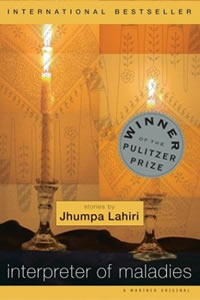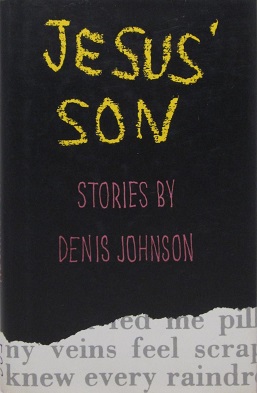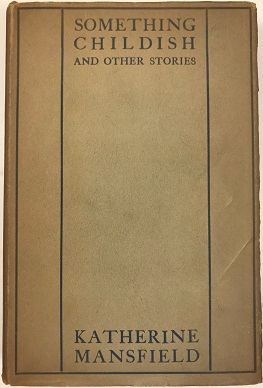
Kathleen Mansfield Murry was a New Zealand writer and critic who is considered to be an important author of the modernist movement. Her works are celebrated across the world, and have been published in 25 languages.
"Bliss" is a modernist short story by Katherine Mansfield first published in 1918. It was published in the English Review in August 1918 and later reprinted in Bliss and Other Stories.

Interpreter of Maladies is a book collection of nine short stories by American author of Indian origin Jhumpa Lahiri published in 1999. It won the Pulitzer Prize for Fiction and the Hemingway Foundation/PEN Award in the year 2000 and has sold over 15 million copies worldwide. It was also chosen as The New Yorker's Best Debut of the Year and is on Oprah Winfrey's Top Ten Book List.
The Knight's Ghost is Child ballad 265. It tells the story of a woman who learns that her husband has died in battle, after which she locks his men in a cellar and throws the keys in the sea. Her husband's ghost appears to ask that she release his men, assuring her they fought bravely. Francis Child drew the ballad from Buchan's Ballads of the North of Scotland.

Betrachtung is a collection of eighteen short stories by Franz Kafka written between 1904 and 1912. It was Kafka's first published book, printed at the end of 1912 in the Rowohlt Verlag on an initiative by Kurt Wolff.
"The Canary" is a short story by Katherine Mansfield. It was first published posthumously in The Nation and Atheneum on 21 April 1923, and later appeared in The Doves' Nest and Other Stories (1923).
"The Garden Party" is a 1922 short story by Katherine Mansfield. It was first published in three parts in the Saturday Westminster Gazette on 4 and 11 February 1922, and the Weekly Westminster Gazette on 18 February 1922. It later appeared in The Garden Party and Other Stories. Its luxurious setting is based on Mansfield's childhood home at 133 Tinakori Road, the second of three houses in Thorndon, Wellington that her family lived in.
"A Dill Pickle" is a 1917 short story by Katherine Mansfield. It was first published in the New Age on 4 October 1917. A revised version later appeared in Bliss and Other Stories. The characters and their relationship possibly were inspired by Mansfield's older sister Vera Margaret Beauchamp and her husband James Mackintosh Bell.
"Je ne parle pas français" is a short story by Katherine Mansfield. She began it at the end of January 1918, and finished it by February 10. It was first published by the Heron Press in early 1920, and an excised version was published in Bliss and Other Stories later that year.
"How Pearl Button Was Kidnapped" is a 1912 short story by Katherine Mansfield. It was first published in Rhythm in September 1912 under the pen name of Lili Heron. It was republished in Something Childish and Other Stories (1924).
"Marriage à la Mode" is a 1921 short story by Katherine Mansfield. It was first published in The Sphere on 31 December 1921, and later reprinted in The Garden Party and Other Stories.
"A Married Man's Story" is an unfinished 1923 short story by Katherine Mansfield. It was first published in The Dial in January 1923, and was reprinted in the London Mercury in April 1923, and then in The Doves' Nest and Other Stories (1923). It was published posthumously and it is incomplete.
"An Indiscreet Journey" is a 1915 short story by Katherine Mansfield.
"The Little Governess" is a 1915 short story by Katherine Mansfield. It was first published in Signature on 18 October 1915 under the pen name of Matilda Berry, and later reprinted in Bliss and Other Stories. The text is written in the modernist mode, without a set structure, and with many shifts in the narrative.

"Maurice, or the Fisher's Cot" is a children's story by the Romantic writer Mary Shelley. Written in 1820 for Laurette Tighe, a daughter of her friends Margaret King and George William Tighe, Mary Shelley tried to have it published by her father, William Godwin, but he refused. The text was lost until 1997, when a manuscript copy was discovered in Italy.

Jesus' Son is a collection of short fiction by Denis Johnson published in 1992 by Farrar, Straus & Giroux. A short story cycle comprising 11 pieces, Jesus' Son is Johnson's most critically acclaimed and popular literary effort, and the work with which Johnson is most identified. In 1999, it was adapted into a film of the same name by Elizabeth Cuthrell, David Urrutia, and Oren Moverman, directed by Alison Maclean.
In a German Pension is a 1911 collection of short stories by the writer Katherine Mansfield; her first published collection. All but three of the stories were originally published in The New Age edited by A. R. Orage; the first to appear was "The Child-Who-Was-Tired". The last three were first published in this collection, and her biographer Anthony Alpers thinks that two were probably rejected by Orage for The New Age.

Something Childish and Other Stories is a 1924 collection of short stories by the writer Katherine Mansfield. It was first published in America as The Little Girl.
Margaret Allan Scott was a New Zealand writer, editor and librarian. After her husband's early death in 1960, she trained as a librarian, and was appointed as the first manuscripts librarian at the Alexander Turnbull Library. She was the second recipient of the Katherine Mansfield Menton Fellowship in 1971.
Hunting Rifle is a 1961 Japanese drama film directed by Heinosuke Gosho. It is based on the 1949 novella of the same name by Yasushi Inoue.